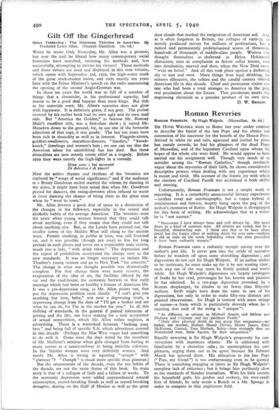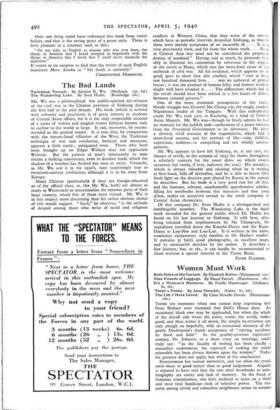Roman Reveries
Roman Fountain. By Hugh Walpole. (Macmillan. 8s. 6d.) SIR HUGH WALPOLE went to Rome last year under contract to describe the burial of the late Pope and the choice and
coronation of his successor for the benefit of the Hearst Press. Attired in white tie and tails, squeezed and jostled by pious but unruly crowds, he had his glimpses of the dead Pope, of Mussolini, and of the legendary Cardinal upon whom the hopes of the whole city were fixed. He would appear to have carried out his assignment well. Though very much of an outsider among the " Roman Catholics," though resolutely vague about the mysteries of their faith, he shows considerable descriptive powers when dealing with any experience which is recent and vivid. His account of the frantic joy with which the election of Cardinal Pacelli was acclaimed is both skilful and moving.
Unfortunately, Roman Fountain is not a simple work of reporting. It is a remarkably unsuccessful literary experiment —neither essay nor autobiography, but a vague hybrid of reminiscence and fantasy, inaptly hung upon the peg of the author's memories of Rome. Sir Hugh Walpole is ill-equipped for this form of writing. He acknowledges that as a writer
he is " not austere."
" Inaccurate I have always been and will always be. My mind floats in a kind of summer mist. All objects are veiled, but by a beautiful, shimmering sun. I think also that to be hazy about detail has the happy effect of making detail for ever new—nothing is old or stale on the tenth beholding when the nine preceding it have been radiantly myopic."
Roman Fountain casts a radiantly myopic survey over the author's past life. It never gets into the stride of narrative before he wanders off upon some shambling digression ; and digressions do not suit Sir Hugh Walpole. If an author wishes to be irrelevant, he must make up for it by not wasting time ; each step out of the way must be firmly guided and worth while. Sir Hugh Walpole's digressions are largely catalogues of books he has read, personages he has known and pictures
he has admired. In a ten-page digression provoked by a Roman shopkeeper, he alludes to no fewer than fifty-one authors. Swift might have done the same in one of his digressions, but only in order to make fifty-one distinct and pointed observations. Sir Hugh is content with mere strings of names—a form which is particularly slovenly when he is
insisting that each of the string is " unique ":
" As different, as unique, as Michael Angelo and Milton and Dickens and Cezanne and my gardener Frank." " Only after physical death do you grasp that uniqueness—my father, my mother, Hubert Henry Davies, Henry James, Ethel McKenna, Conrad, Tom Herbert, Boley—how strangely they are illuminated now, these figures, by their uniqueness."
Equally annoying is Sir Hugh Walpole's propensity for con- versations with inanimate objects. He is addressed with familiarity by a chocolate cake ; he apostrophises his own pictures, urging them not to be upset because Sir Edward Marsh has ignored them. His allocution to the Slate Pope (" Pius, nay friend") is too embarrassing even to be quoted. There is something engaging at times in Sir Hugh Walpole's complete lack of reticence ; but it brings him perilously close
to the standards of Sunday journalism. With his little secrets, his household gods, his garden and rockery, his ever-ready lists of friends, he only needs a Bunch or a Mr. Sponge in order to compete in that unpleasant field. Only one thing could have redeemed this book from entire failure, and that is the saving grace of a prose style. There is little pleasure in a sentence such as this: " On my side, as English as anyone who was ever born, the things in America that I hated mingled so hopelessly with the things in America that I loved that I could never reconcile the opposites."
It comes as no surprise to find that the writer of such English translates Mors Acerba as " My death is untimely."
CHRISTOPHER HOBHOUSE.















































 Previous page
Previous page